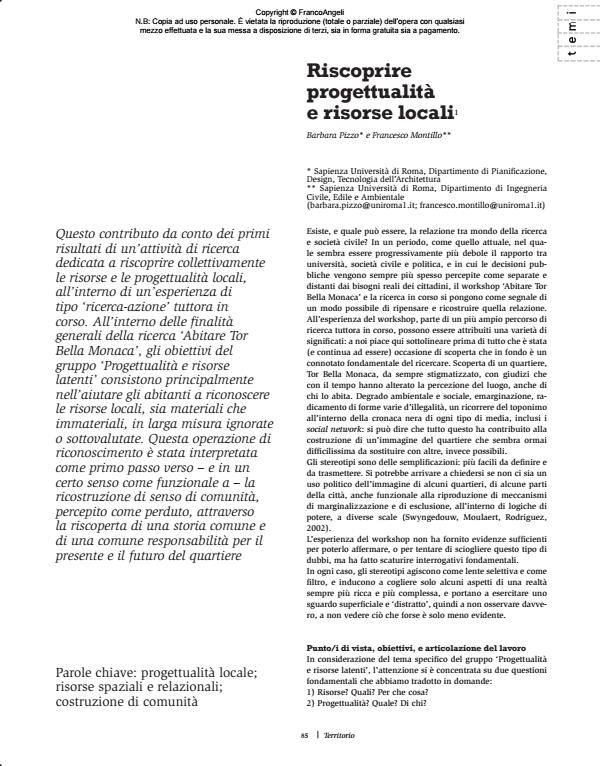Riscoprire progettualità e risorse locali
Titolo Rivista TERRITORIO
Autori/Curatori Barbara Pizzo, Francesco Montillo
Anno di pubblicazione 2016 Fascicolo 2016/78
Lingua Italiano Numero pagine 8 P. 85-92 Dimensione file 290 KB
DOI 10.3280/TR2016-078010
Il DOI è il codice a barre della proprietà intellettuale: per saperne di più
clicca qui
Qui sotto puoi vedere in anteprima la prima pagina di questo articolo.
Se questo articolo ti interessa, lo puoi acquistare (e scaricare in formato pdf) seguendo le facili indicazioni per acquistare il download credit. Acquista Download Credits per scaricare questo Articolo in formato PDF

FrancoAngeli è membro della Publishers International Linking Association, Inc (PILA), associazione indipendente e non profit per facilitare (attraverso i servizi tecnologici implementati da CrossRef.org) l’accesso degli studiosi ai contenuti digitali nelle pubblicazioni professionali e scientifiche.
Questo contributo da conto dei primi risultati di un’attività di ricerca dedicata a riscoprire collettivamente le risorse e le progettualità locali, all’interno di un’esperienza di tipo ‘ricerca-azione’ tuttora in corso. All’interno delle finalità generali della ricerca ‘Abitare Tor Bella Monaca’, gli obiettivi del gruppo ‘Progettualità e risorse latenti’ consistono principalmente nell’aiutare gli abitanti a riconoscere le risorse locali, sia materiali che immateriali, in larga misura ignorate o sottovalutate. Questa operazione di riconoscimento è stata interpretata come primo passo verso - e in un certo senso come funzionale a - la ricostruzione di senso di comunità, percepito come perduto, attraverso la riscoperta di una storia comune e di una comune responsabilità per il presente e il futuro del quartiere
Parole chiave:Progettualità locale; risorse spaziali e relazionali; costruzione di comunità
- Salti di scala. Pianificazione, progetti integrati e pratiche di innovazione sociale a Bari Carla Tedesco, in TERRITORIO 102/2023 pp.60
DOI: 10.3280/TR2022-102010
Barbara Pizzo, Francesco Montillo, Riscoprire progettualità e risorse locali in "TERRITORIO" 78/2016, pp 85-92, DOI: 10.3280/TR2016-078010